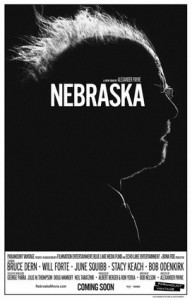film review: nebraska
With the Academy Awards just a week away, a film with no less than six Oscar nominations is sure to generate a decent amount of interest. Nebraska is a contender for Best Picture alongside major films like Wolf of Wall Street and American Hustle, and film lovers should count it among the Oscar nominees they plan to see.
Nebraska comes from director Alexander Payne, whose recent film The Descendants took home Best Adapted Screen Play at the Oscars in 2012. That film was also nominated for Best Picture, and to follow it up so quickly with another directorial success is very impressive. Like The Descendants, Nebraska is a raw, heartfelt film that is free of glamour and full of reality.
The film opens with Korea veteran Woody Grant (Bruce Dern) being questioned by a police officer as he wanders along the side of an American road. It turns out he is hoping to get all the way from Billings, Montana to Lincoln, Nebraska. Why? Well, he has won a million dollars. Or so a letter from a marketing company, personally addressed to Woody, would have him believe. His wife Kate (June Squibb) is fed up with her husband and refuses to indulge him by taking him to Nebraska. As Woody simply starts his journey by foot, his thirty-something son David (Will Forte) gives in and agrees to drive his father to Nebraska to collect his million dollars…or at least to stop him wandering off on his own.
As David and Woody get closer to Nebraska, David begins to learn a lot about his father. Some things, like his alcoholism, were already on the table. A stop in Woody’s home town to stay with one of his many brothers, though, reveals parts of Woody’s childhood and time in Korea that his son would have never otherwise known. They are joined by Kate and other son Ross (Bob Odenkirk) for the weekend, and the family has to deal with each other and cope the best they can.
The character of Woody is the centre of the film, yet at the beginning he is not treated like a person; his wife Kate puts him down in front of his sons. This element to the film shares a hard truth about the way older people are sometimes treated, especially when their minds start to deteriorate. David, though, is slightly more willing to humour his father despite knowing the letter is undoubtedly just another marketing scam. He suggests Woody just needs ‘something to live for’, and perhaps David is looking for the very same.
The film is slow moving, just like the road trip it follows. The relationships gradually develop scene by scene, and each character is slowly but surely examined. For a set of people that were not at all likeable as the movie opened, the film challenges you to look beyond their bristly personalities and understand what lies beneath.
Both Woody and David are complex characters, but David is much warmer and easier to understand. Woody is hard, but the character is intriguing and invites some empathy. The female characters are either wives or old girlfriends, but the character of Kate is much more interesting than she first seems: refreshingly, it is not just the male characters that are explored at a deeper than surface level. As the film opens she just seems like a clichéd nagging wife, but as the story develops we see more to her just as we see much more to Woody and David.
While the film is without action or high drama, Nebraska is multi-layered. The story is often sad and hard to take in, yet a defining feature of the film is its dry and constant humour. The audience is invited to laugh with the characters about the painful realities of ageing, families and trying to understand each other. This somewhat positive element to the film leads into a quietly sweet ending that makes the rather long film worthwhile.
It is, of course, important to mention that Nebraska is a film shot in black and white. The long road trip through small towns in America is made to look very stark in this way, and the emptiness of the locations the characters pass through is emphasised by this lack of colour. The choice of black and white also seems to put the lives of the characters into a particular perspective: they are not flashy or colourful, but ordinary folk dealing with family and life.
Nebraska was long and felt as such, but perhaps it needed to be in order to tell its story. Whether it will pick up awards at the Oscars remains to be seen, but it is certainly a unique and interesting film. Although Nebraska didn’t entertain with soaring highs and lows and intense emotions, it does offer plenty to think about in its own quiet way.
Image Credit


